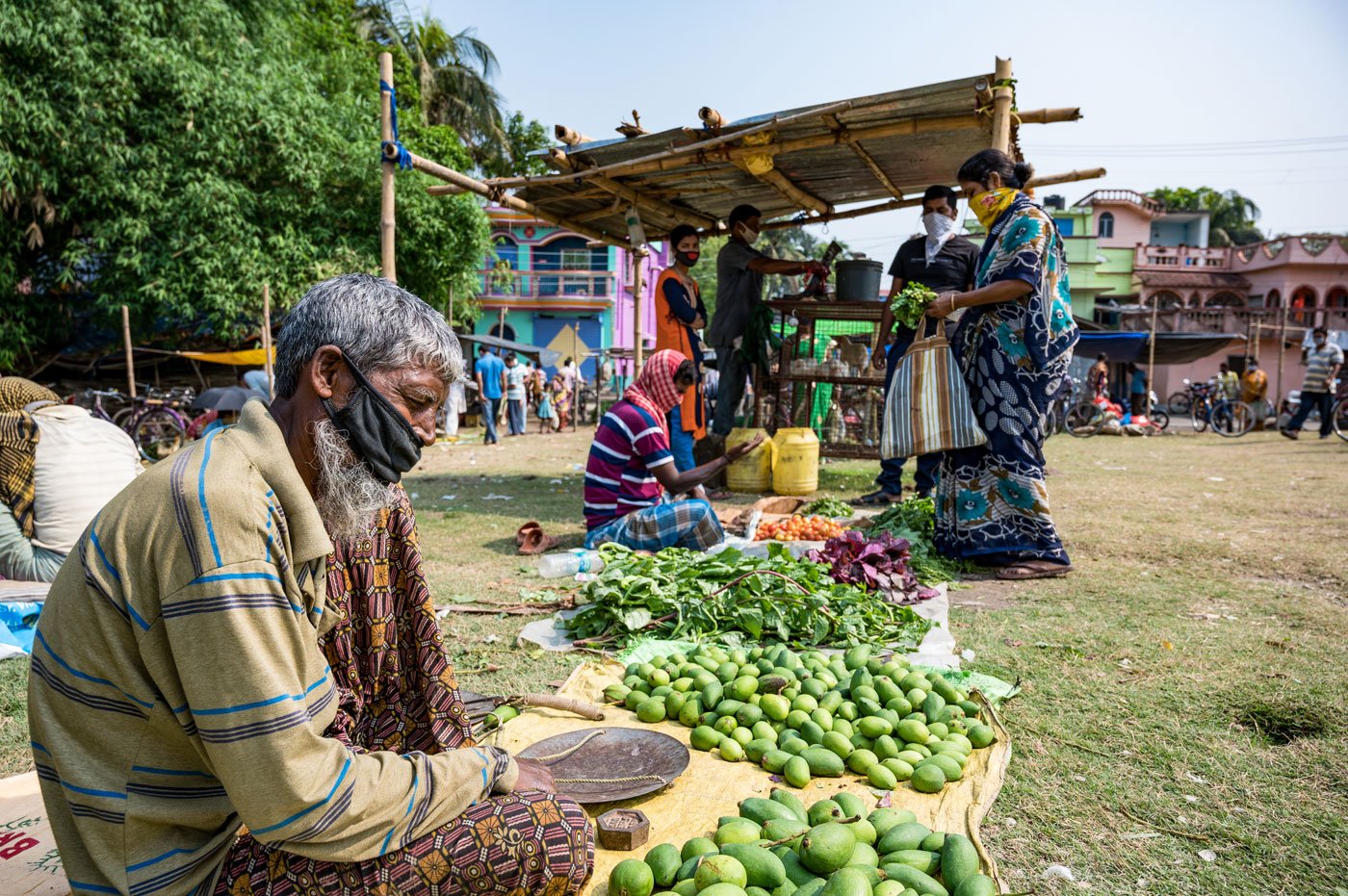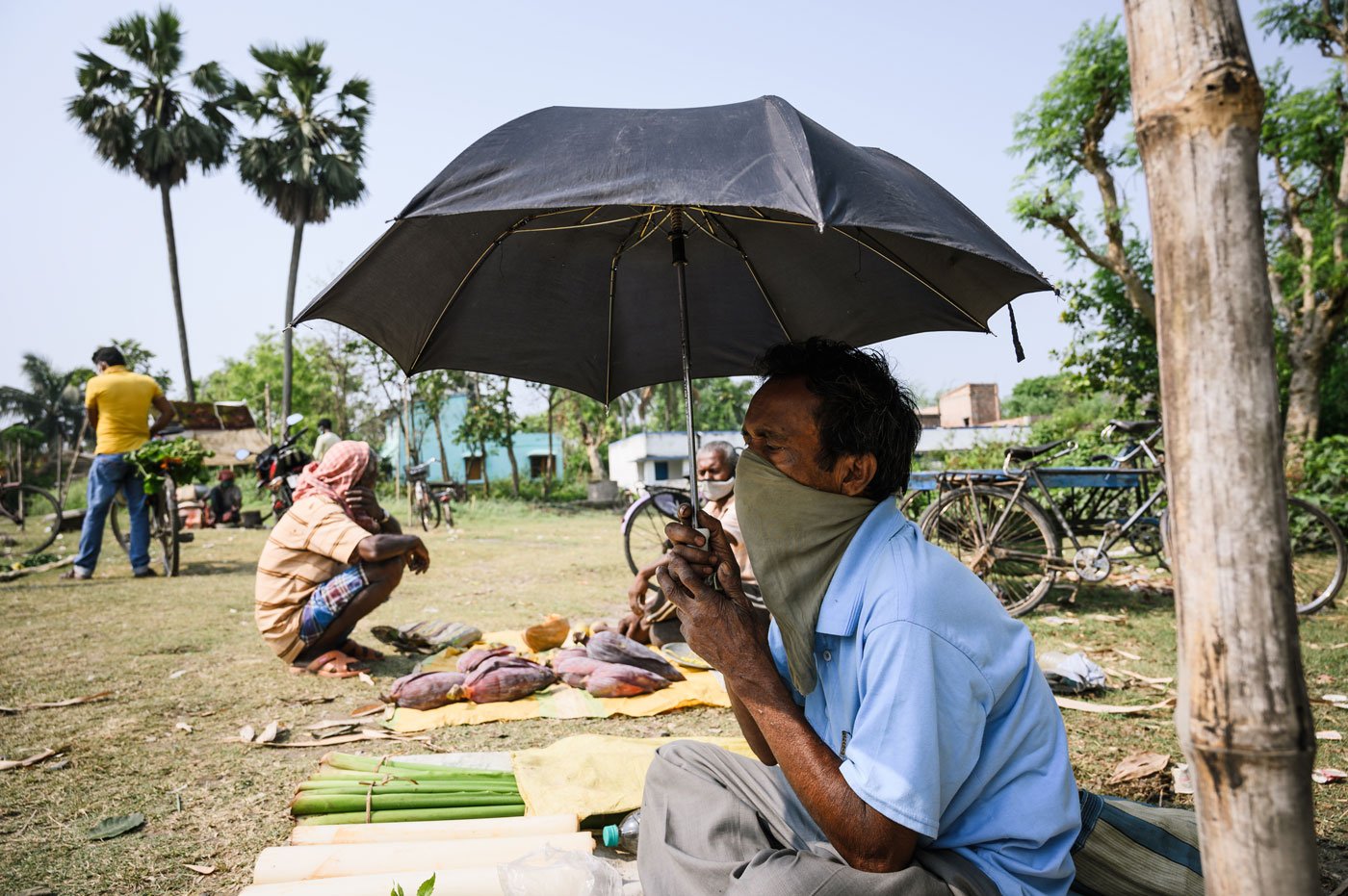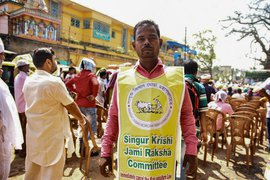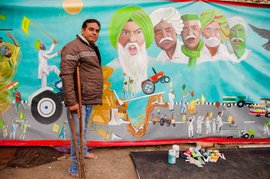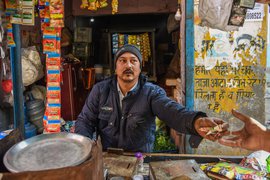कोविड-19 लॉकडाउन के कारण पश्चिम बंगाल के नदिया जिले में तेहट्टा गांव के चतोर पाड़ा की नियमित सब्ज़ी मंडी को बंद कर दिया गया था, जिसके बाद वहां के लोगों ने इस गांव के दत्ता पाड़ा इलाके में, एक खुले मैदान में अस्थायी बाज़ार बना लिया है, जो सुबह 6 बजे से 10 बजे तक खुला रहता है। तेहट्टा ब्लॉक 1 में स्थित इस गांव को पश्चिम बंगाल सरकार द्वारा अप्रैल में ‘हॉटस्पॉट’ घोषित कर दिया गया है। बाज़ार के दिन की कुछ तस्वीरें:
48 वर्षीय प्रोसांतो मोंडल सुबह में दाल-पूड़ी और शाम को आलू बोंडा बेचते थे। लेकिन लॉकडाउन में पके हुए स्ट्रीट फूड पर प्रतिबंध लग जाने के कारण , उन्होंने सब्ज़ियां बेचनी शुरू कर दीं। पहले जहां वह रोज़ाना 400 रुपये कमाया करते थे, आज वह दैनिक आय घट कर मुश्किल से 150 रुपये रह गई है। “ मैं सब्ज़ी के व्यापार से बहुत ज़्यादा परिचित नहीं हूं ,” वह कहते हैं।
56 वर्षीय सब्ज़ी विक्रेता राम दत्ता , शांति हल्दर से नींबू की चाय ख़रीद रहे हैं। उनकी आय पहले 300 रुपये दैनिक हुआ करती थी, जो अब घट कर आधी रह गई है। वह कहते हैं , “ पहले मेरी बहुत ज़्यादा बिक्री नहीं होती थी , अब स्थिति और भी ख़राब है। ” 48 वर्षीय शांति हल्दर 20 साल से झालमुरी (पश्चिम बंगाल का एक लोकप्रिय स्ट्रीट फूड) बेच रहे थे , लेकिन लॉकडाउन में पके हुए स्ट्रीट फूड पर प्रतिबंध लग जाने के कारण , वह चाय बेच रहे हैं। उनकी आय भी 250-300 रुपये से घटकर 100-120 रुपये प्रति दिन रह गई है।
सुखेन (बाएं) और प्रोसेनजीत हल्दर (दाएं) आपस में भाई हैं। सुखेन एक रेस्त्रां में खाना बनाते थे और 10,000 रुपये मासिक पाते थे, लेकिन अब मुश्किल से एक दिन में 200 रुपये कमाते हैं – और वह भी अनिश्चित है। प्रोसेनजीत मछली पालन के तालाब में और राजमिस्त्री के अंशकालिक सहायक के रूप में काम किया करते थे। उनकी कमाई बहुत मामूली थी – दोनों स्रोत से लगभग 250 रुपये प्रति दिन – लेकिन वह मछली पालन के तालाब से कुछ मछली घर ले आते थे। लॉकडाउन के दौरान अब वह भी बंद हो गया है।
बाएं: 47 वर्षीय प्रफुल्ल देबनाथ, 23 साल से समबय कृषि उन्नयन समिति मार्केट (अब लॉकडाउन के कारण बंद है) में छोटे-मोटे काम करते रहे हैं। वह ग्राहकों के घरों तक पहुंचाई जाने वाली बोरियां लाते हैं, और वाहनों से सामान उतारकर दुकानों में पहुंचाते हैं। और वह पूरे बाज़ार में झाड़ू लगाते हैं – बदले में प्रत्येक सब्ज़ी विक्रेता से प्रति दिन 2 रुपये और अन्य दुकानदारों से 1 रुपया लेते हैं। लेकिन अब , चूंकि बाज़ार दत्ता पाड़ा में स्थानांतरित हो गया है , उनकी मामूली कमाई भी आधी रह गई है , हालांकि कुछ सब्ज़ी विक्रेता देबनाथ के लिए नाश्ते और दोपहर के भोजन की व्यवस्था कर देते हैं। “अगर मैं सफ़ाई न करूं , तो बाज़ार गंदा रहेगा ,” वह कहते हैं। “ अगर मैं बाज़ार की सफ़ाई करूंगा तो सभी लोग मेरा नाम जान जाएंगे। कोई भी मेरी तरह काम नहीं करेगा! ” दाएं: चूंकि बाज़ार कुछ घंटों के लिए ही खुलता है , इसलिए कई लोग क़ीमतें कम होने की उम्मीद में अंतिम समय में ख़रीदारी करते हैं। 50 वर्षीय खोका रॉय एक बढ़ई थे , फिर उन्होंने घर से एक छोटी सी किराने की दुकान चलाई , और अब लॉकडाउन के कारण बाज़ार में सामान बेच रहे हैं। उनकी दैनिक आय 400-500 रुपये से घटकर अब केवल 200-250 रुपये रह गई है। “पुलिस गश्त लगा रही है , इसलिए लोग अपने घरों से नहीं निकल रहे हैं ,” वह कहते हैं , “ आप ही बताइये , हम सब्जियां कैसे बेच सकते हैं ?”
परिमल दलाल के स्टाल से सब्ज़ी उठाते ग्राहक। 30 साल से यह काम कर रहे 51 वर्षीय परिमल , दूसरों की तुलना में ज़्यादा आत्मविश्वास से भरे हुए हैं , और कहते हैं , “ मेरे व्यवसाय में ज़्यादा परिवर्तन नहीं हुआ है। मैं जिन ग्राहकों से परिचित हूं , वे यहां भी आ रहे हैं। ”
कार्तिक देबनाथ अंडे , अदरक , प्याज़ , मिर्ची , लहसुन , और अन्य सब्ज़ियां बेचते हैं। वह 47 साल के हैं , और तीन दशकों से यह काम कर रहे हैं। “मेरा व्यवसाय अच्छा चल रहा है ,” वह कहते हैं , “ और कुछ नए ख़रीदार भी जुड़ गए हैं। ”
कई लोग कामचलाउ मास्क का उपयोग कर रहे हैं, जैसे कि 37 वर्षीय किसान और अंशकालिक सब्ज़ी विक्रेता बबलू शेख़ अपना गमछा इस्तेमाल कर रहे हैं।
बाएं: 45 वर्षीय खाकोन प्रमाणिक , जो मुर्गियां बेचते हैं और कभी-कभी निर्माण स्थलों पर काम करने के लिए दूसरे राज्यों में चले जाते हैं , अब दोनों स्रोतों से होने वाली आय के कम हो जाने से संघर्ष कर रहे हैं। दाएं: 62 वर्षीय भरत हल्दर राजमिस्त्री के सहायक हुआ करते थे , लेकिन अधिक कमाई करने की उम्मीद में तीन साल पहले उन्होंने मछलियां बेचनी शुरू कर दीं। वह बताते हैं कि लॉकडाउन के दौरान उनकी कमाई 250 रुपये से घटकर 200 रुपये प्रति दिन रह गई है। मछली की आपूर्ति भी अनिश्चित है। “लॉकडाउन के कारण आंध्र प्रदेश से मछली नहीं आ रही है ,” वह बताते हैं। “इसलिए अब यहां स्थानीय तालाब और नदी की मछलियां [कम मात्रा में] बिक रही हैं।”
62 वर्षीय श्रीदम मोंडल , मुख्य रूप से केले और कभी-कभार सब्ज़ियां भी बेचते हैं। “[लॉकडाउन के दौरान] बिक्री बहुत कम हो रही है ,” वह कहते हैं।
56 वर्षीय साधु शेख को मैदान के ठीक बाहर, दूसरे विक्रेता जहां बैठे हैं वहां से दूर, एक जगह मिल गई है। वह अपने छोटे से खेत के आम और सब्ज़ियां बेच रहे हैं।
58 वर्षीय सदानंद रॉय, सूरज से अस्थायी छाया के रूप में उपयोग करने के लिए प्लास्टिक की चादर के बिना , एक छतरी पकड़े सब्ज़ियों के साथ मैदान के बीच में बैठे हैं। वह दिल्ली में एक घरेलू कामगार थे , लेकिन लॉकडाउन से पहले घर आ गए। उनकी एकमात्र आय अब कुछ सब्ज़ियां बेचने से आती है , जिससे उन्हें रोज़ाना 50-100 रुपये मिल जाते हैं। “मैं यहां नियमित रूप से नहीं आ पाया क्योंकि कभी-कभी मेरे पास बेचने के लिए सब्ज़ियां नहीं होती हैं ,” वह कहते हैं , “ मुझे नहीं पता कि भविष्य में क्या होगा। ”
हिंदी अनुवाद: मोहम्मद क़मर तबरेज़
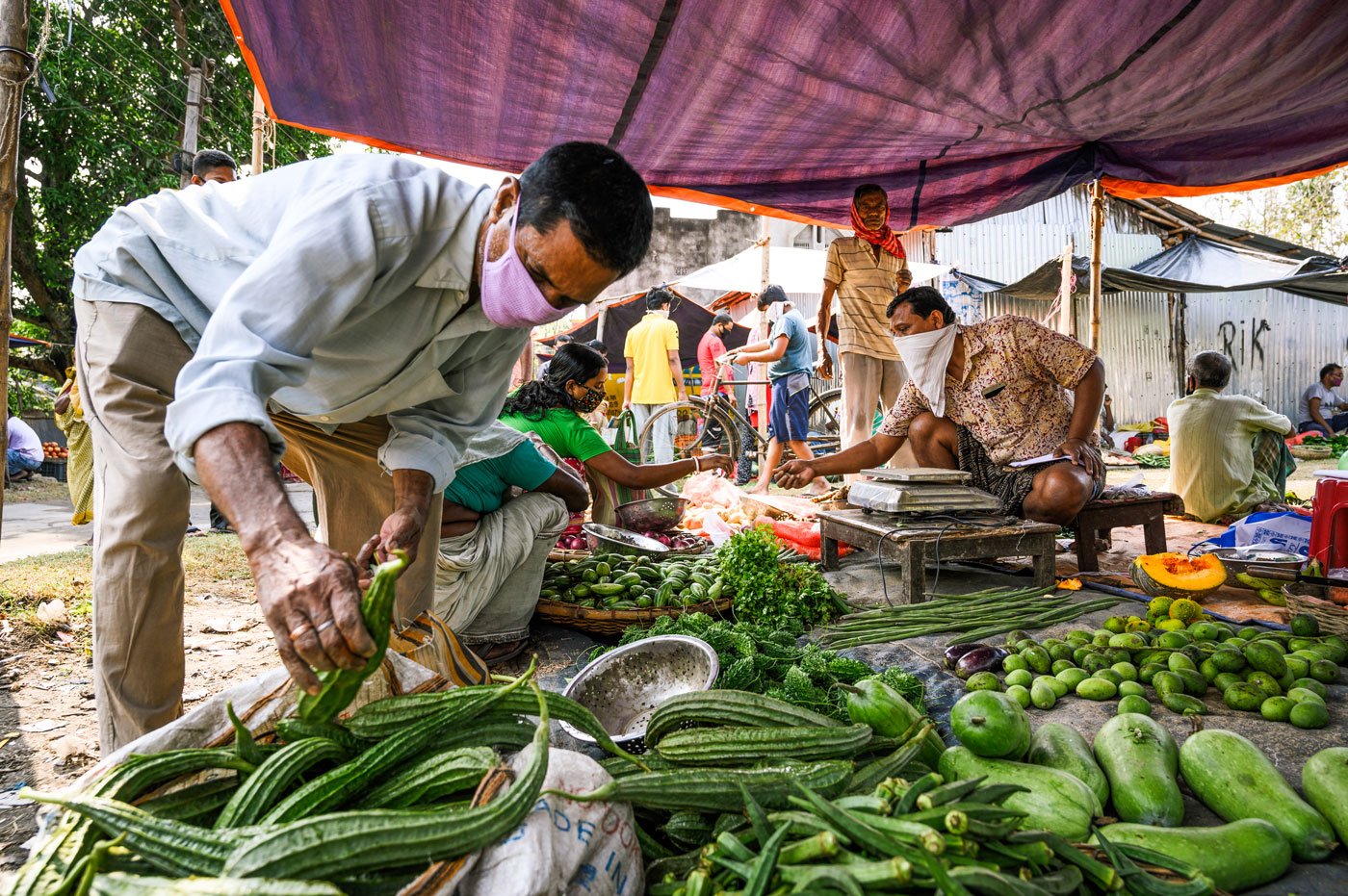
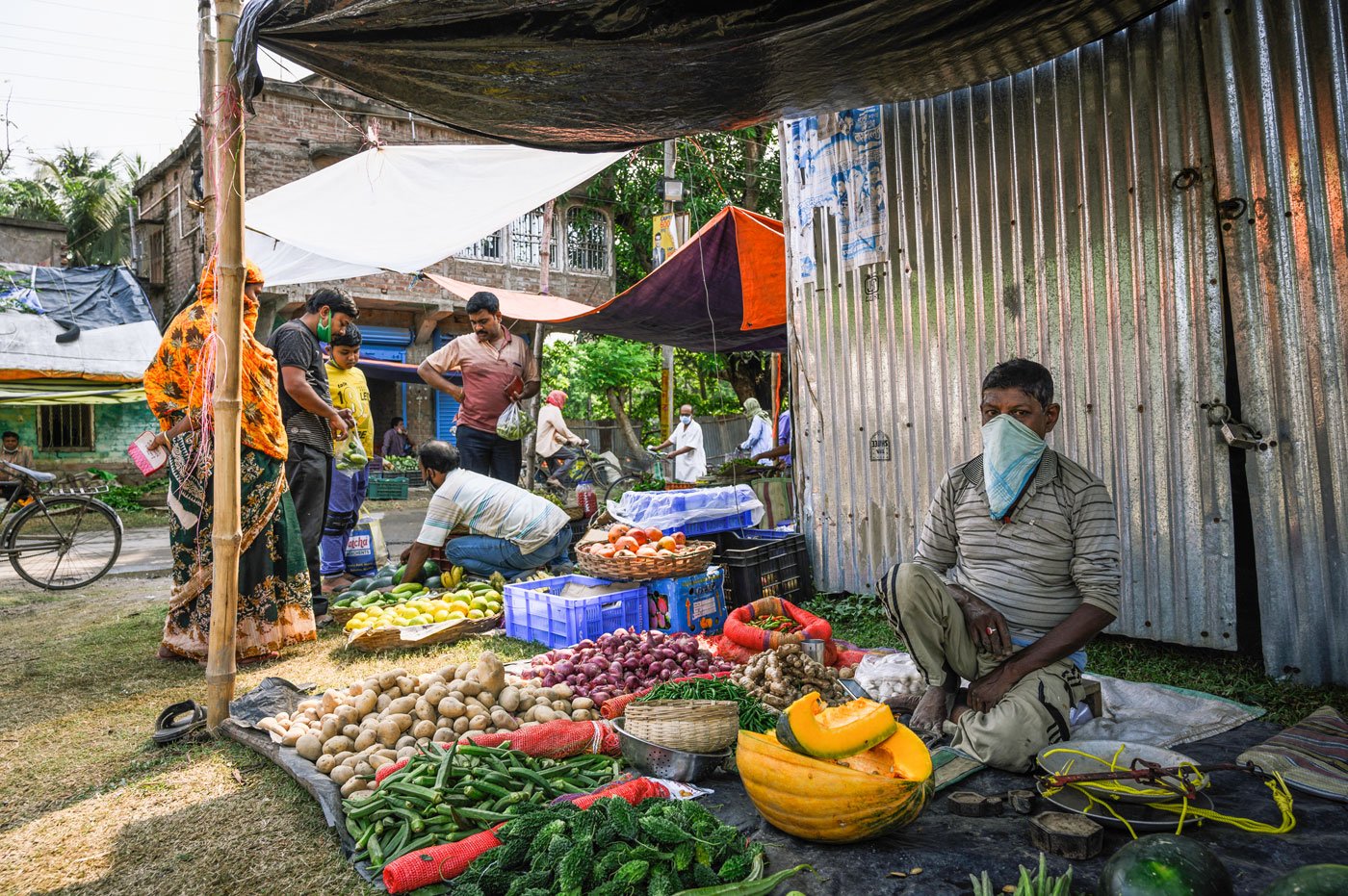
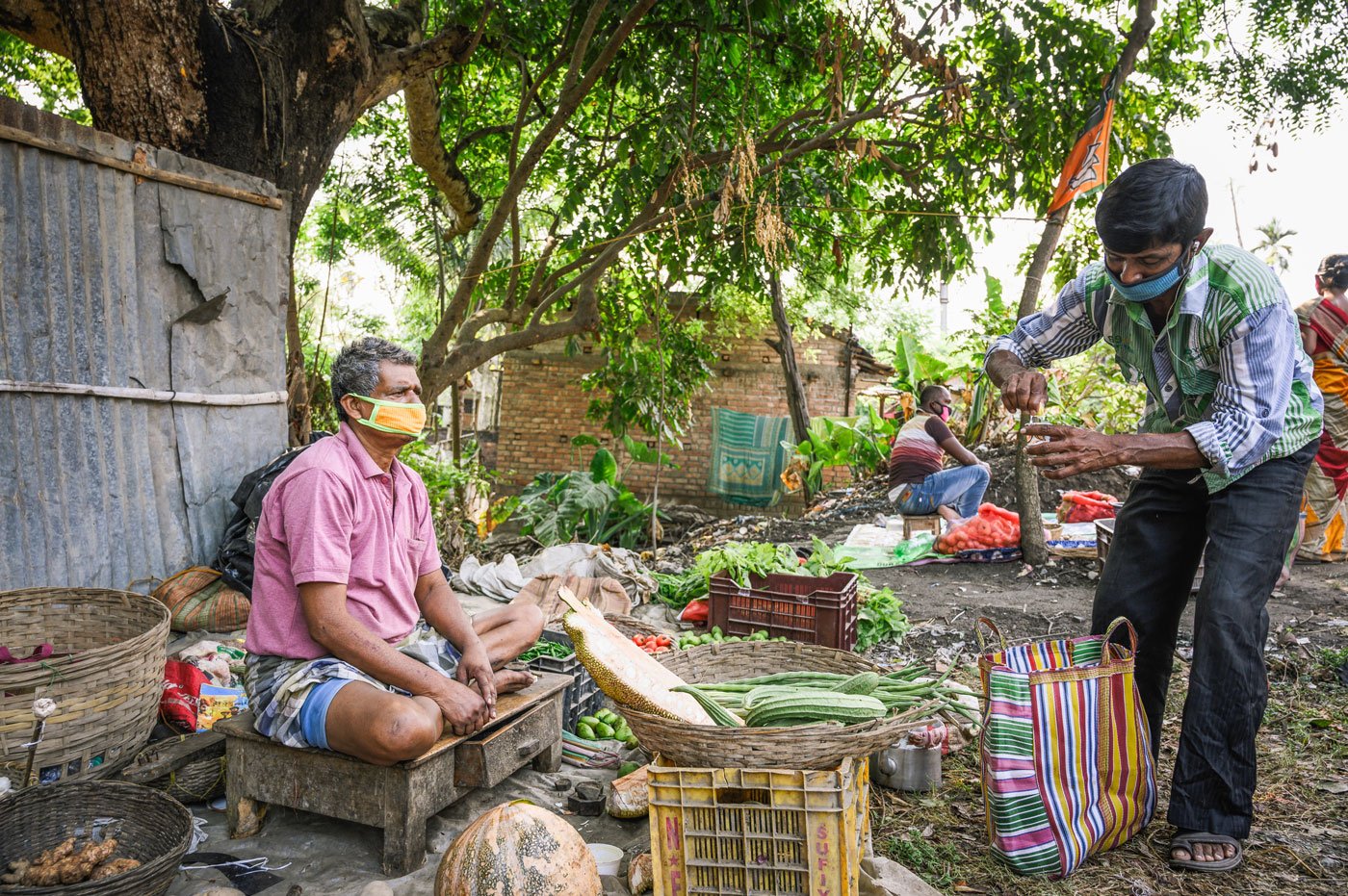
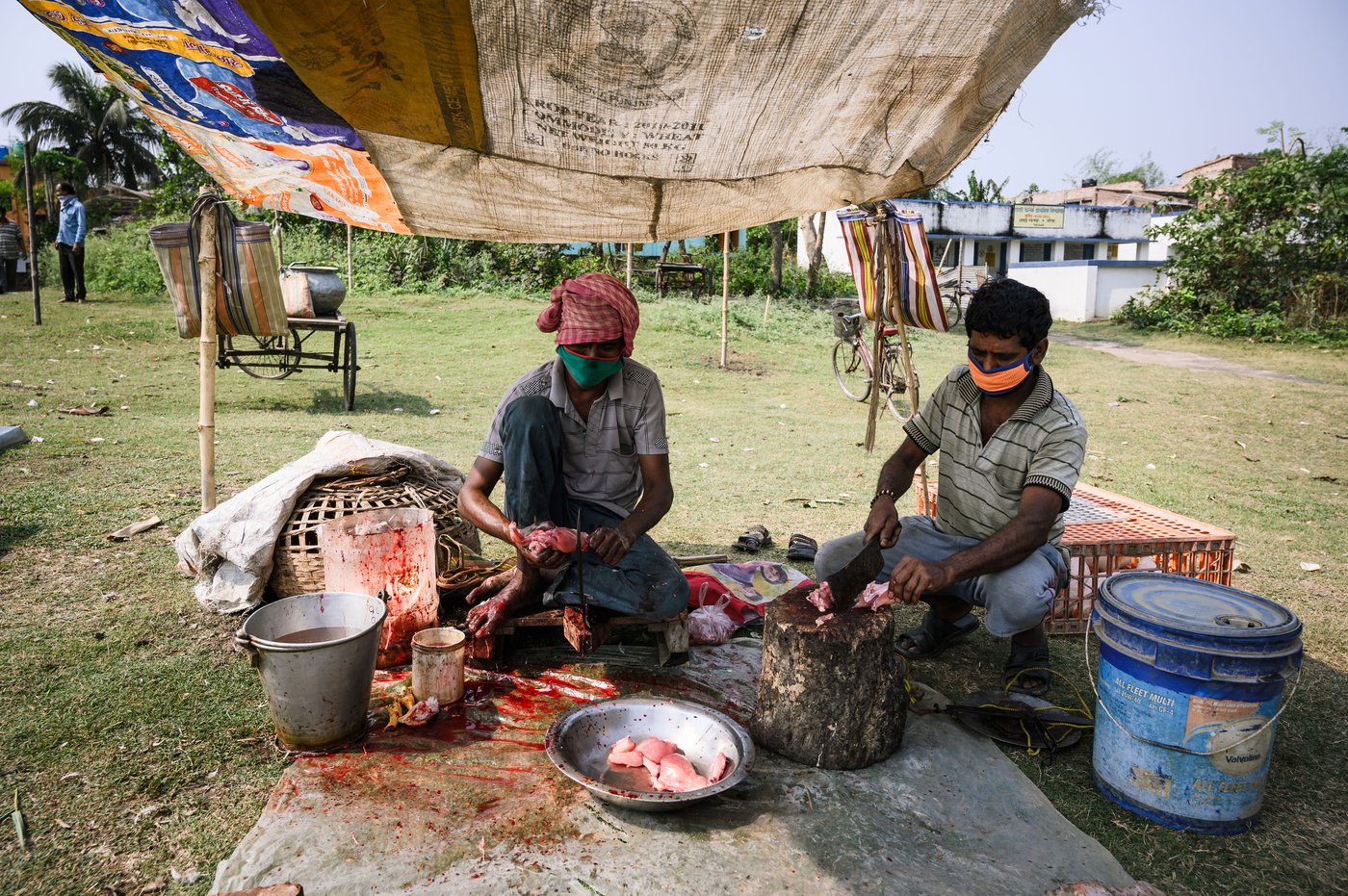
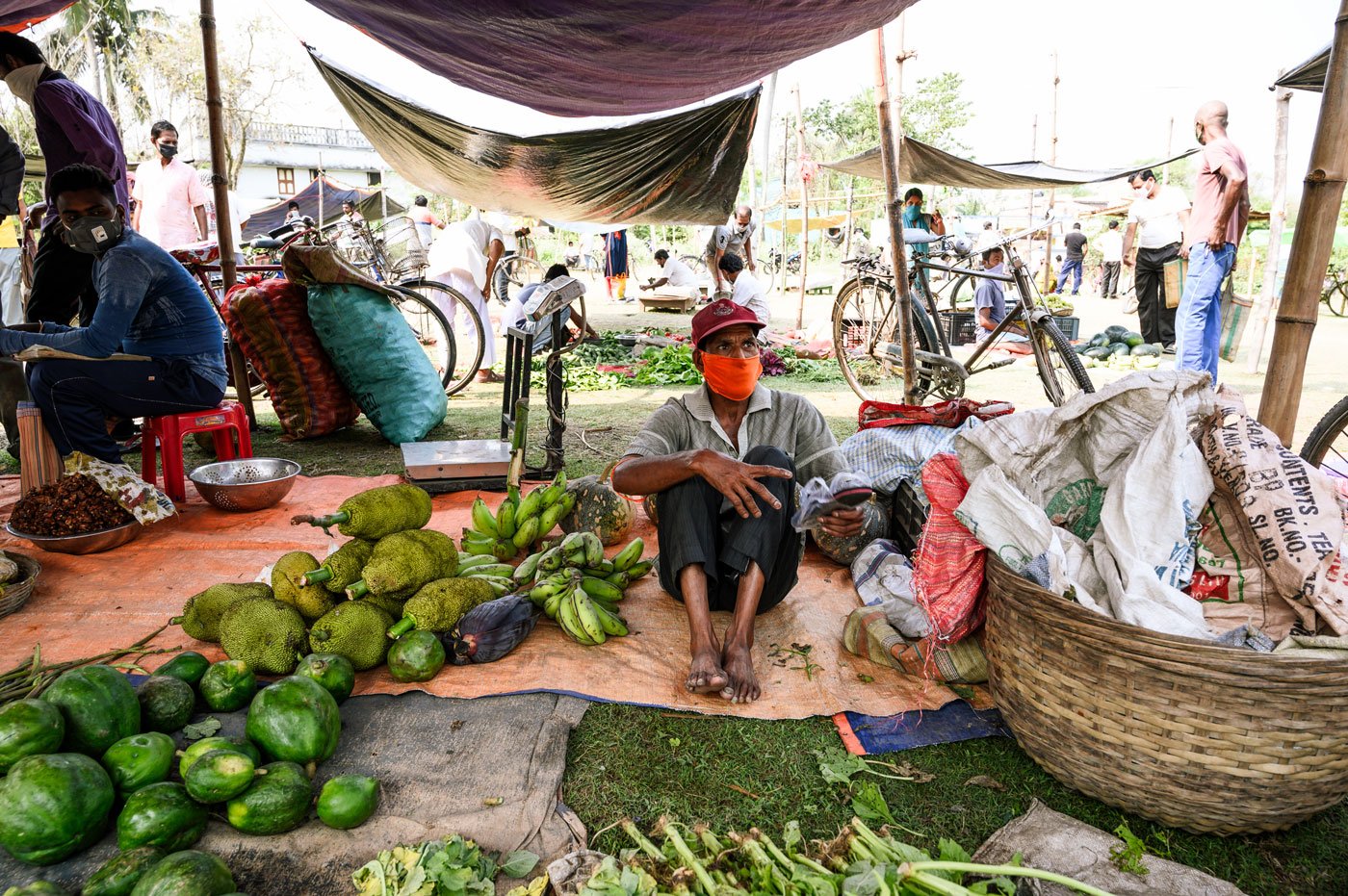
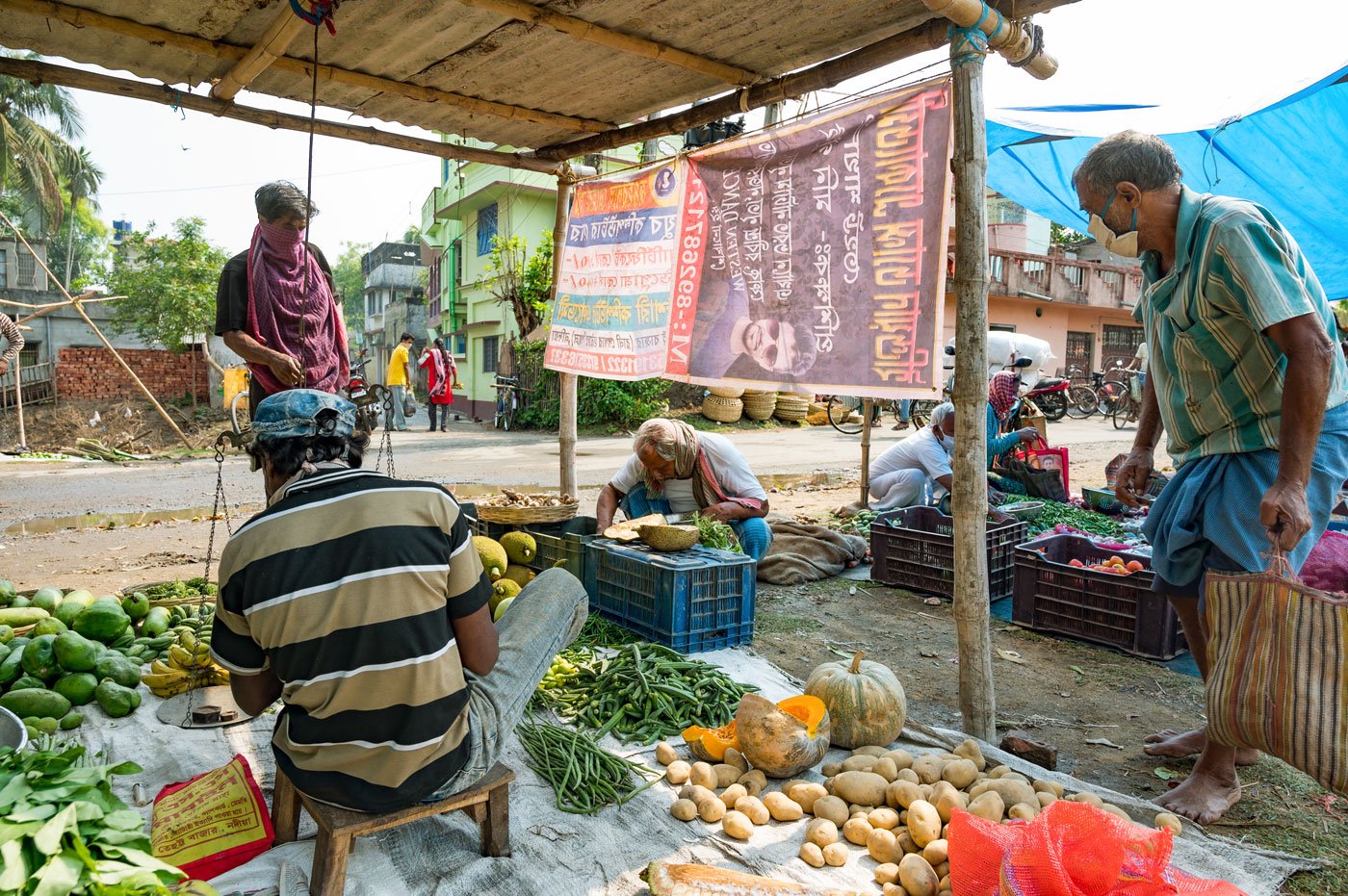
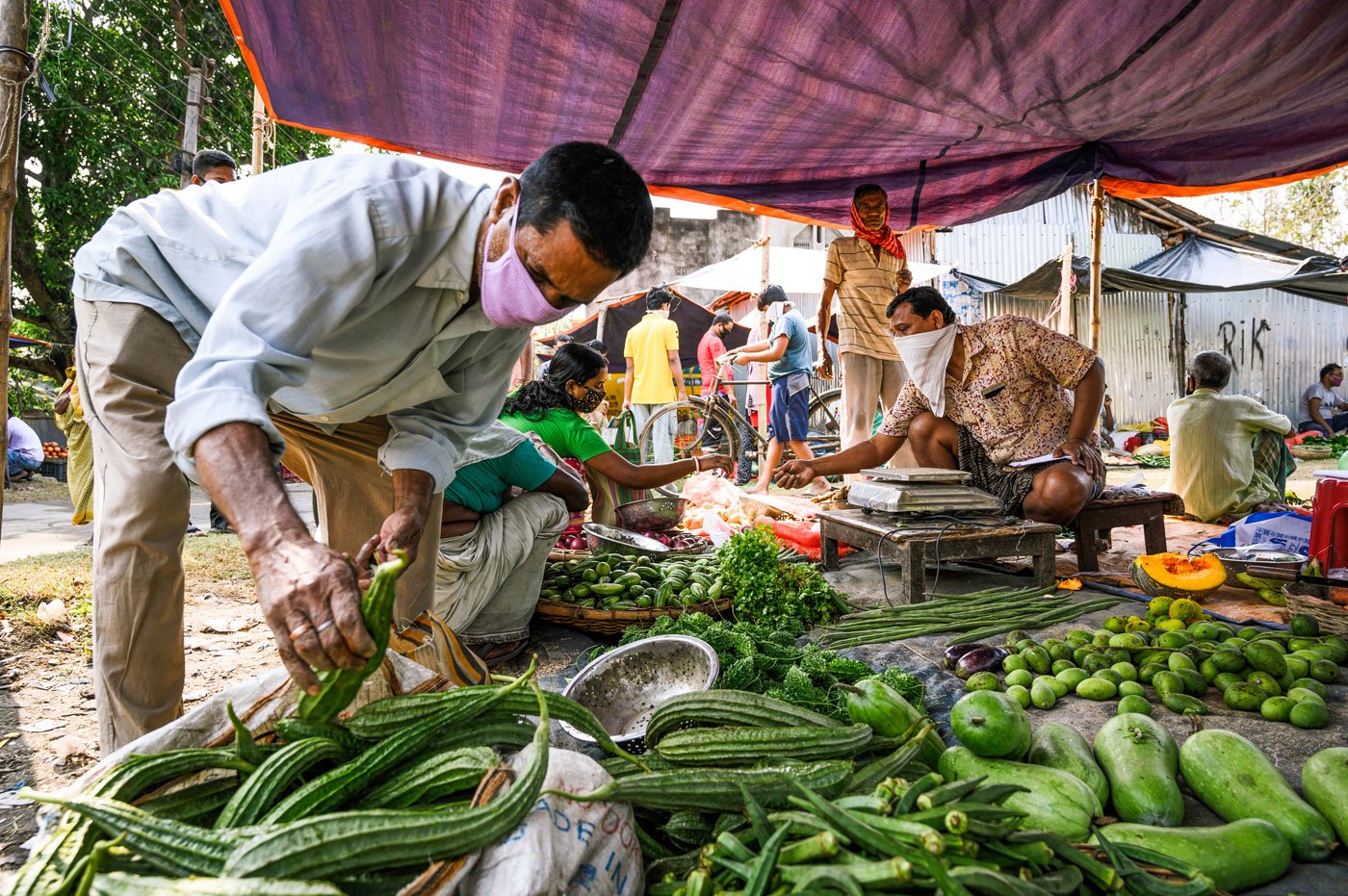
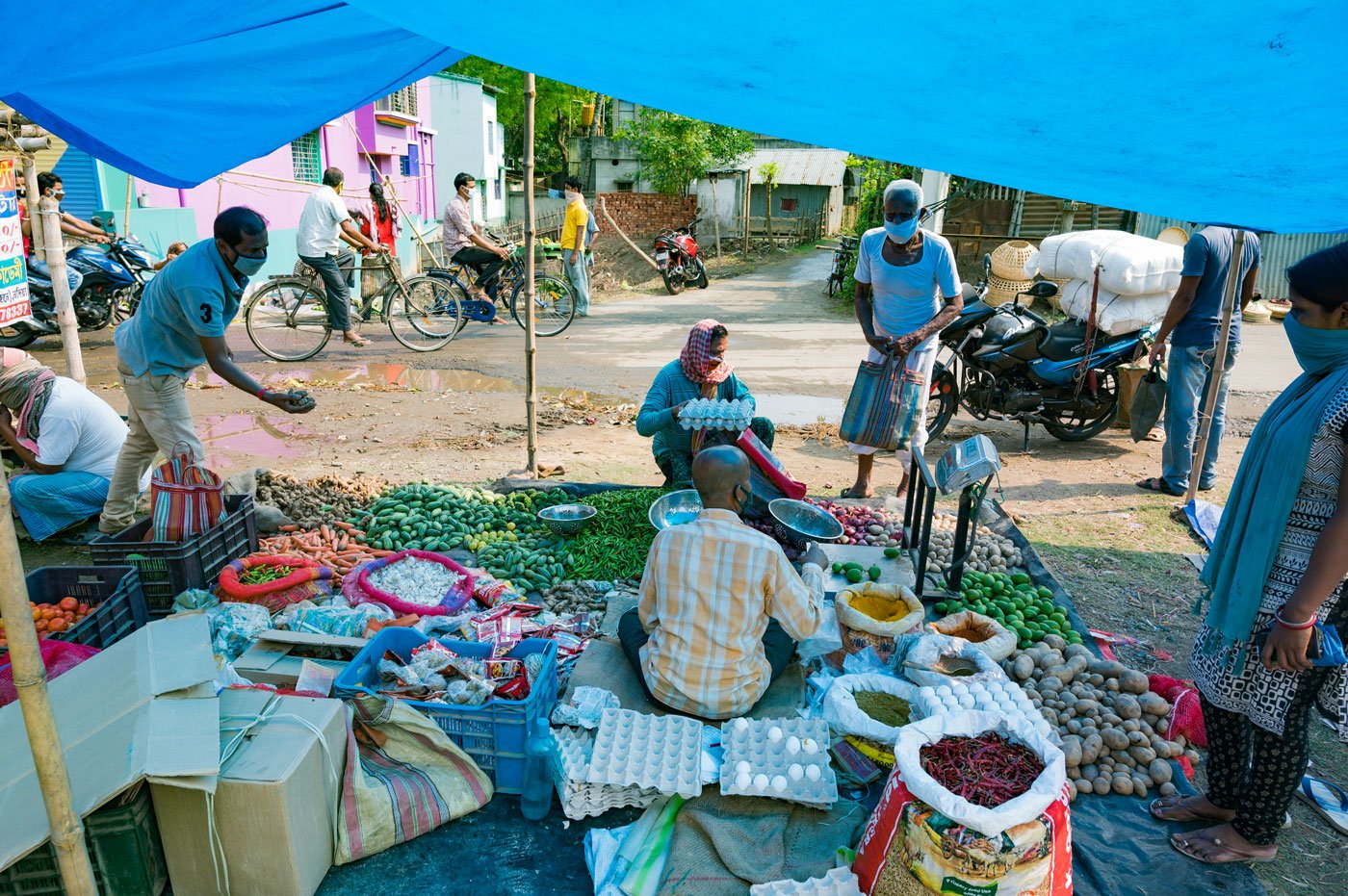
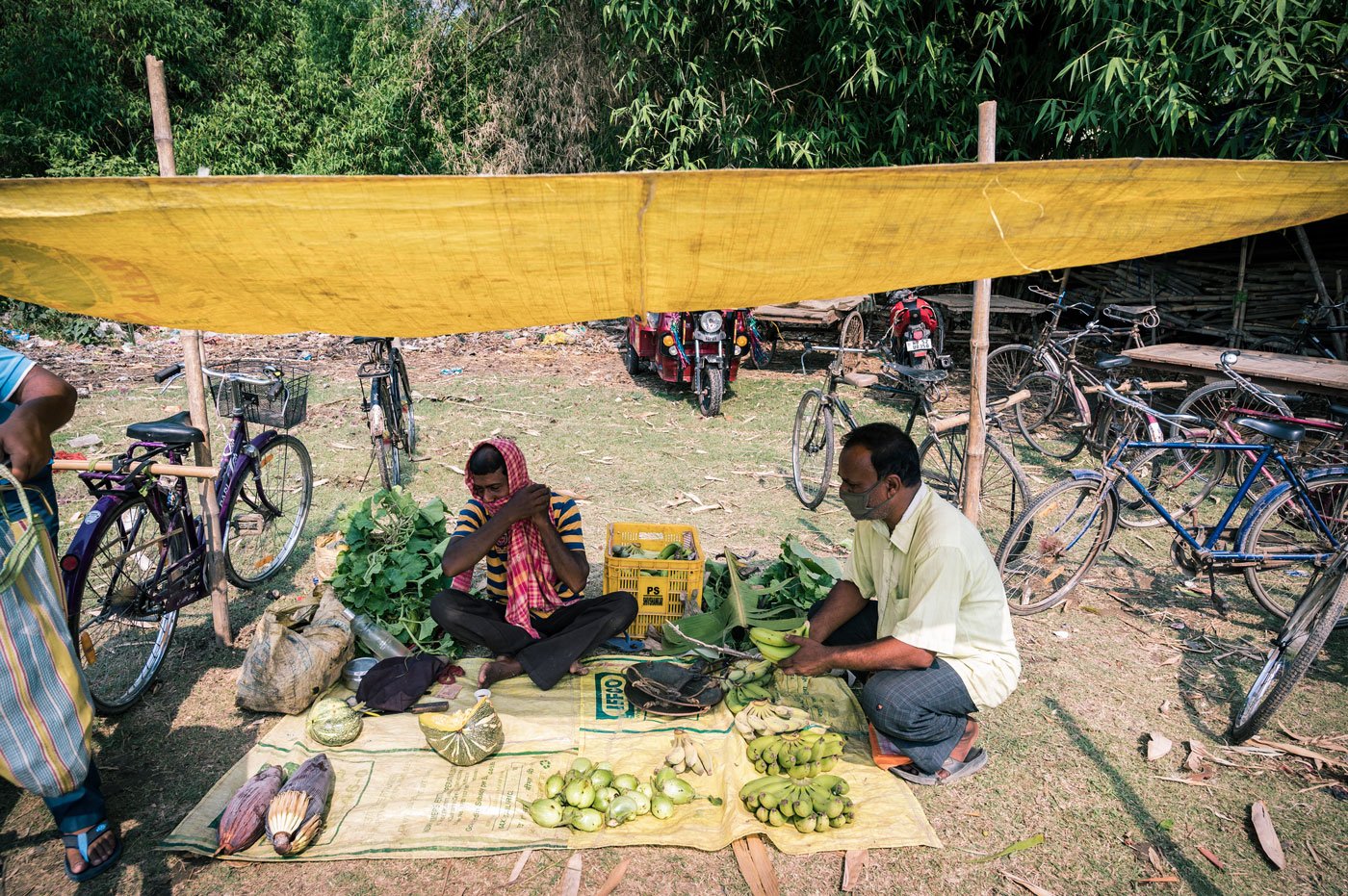
![Left: Khakon Pramanick, 45, who sells chickens and sometimes migrates to other states to work at construction sites, is now struggling with a drop from both sources of income. Right: Bharat Halder, 62, was a mason’s helper before he started selling fish around three years ago, hoping to earn more. During the lockdown, his earnings have dropped from around Rs. 250 a day to less that Rs. 200, he says. The supply of fish is also uncertain. “Fish is no longer coming from Andhra Pradesh due to the lockdown,” he says. “So the local pond and river fish [in smaller quantities] are now sold here.”](/media/images/09a-_DSC0045.max-1400x1120.jpg)
![Left: Khakon Pramanick, 45, who sells chickens and sometimes migrates to other states to work at construction sites, is now struggling with a drop from both sources of income. Right: Bharat Halder, 62, was a mason’s helper before he started selling fish around three years ago, hoping to earn more. During the lockdown, his earnings have dropped from around Rs. 250 a day to less that Rs. 200, he says. The supply of fish is also uncertain. “Fish is no longer coming from Andhra Pradesh due to the lockdown,” he says. “So the local pond and river fish [in smaller quantities] are now sold here.”](/media/images/09b-_DSC9999-2.max-1400x1120.jpg)
![Sridam Mondal, 62, mainly sells bananas and, at times, also a few vegetables. “The sales are very low [during the lockdown],” he says.](/media/images/10-_DSC9985.max-1400x1120.jpg)
